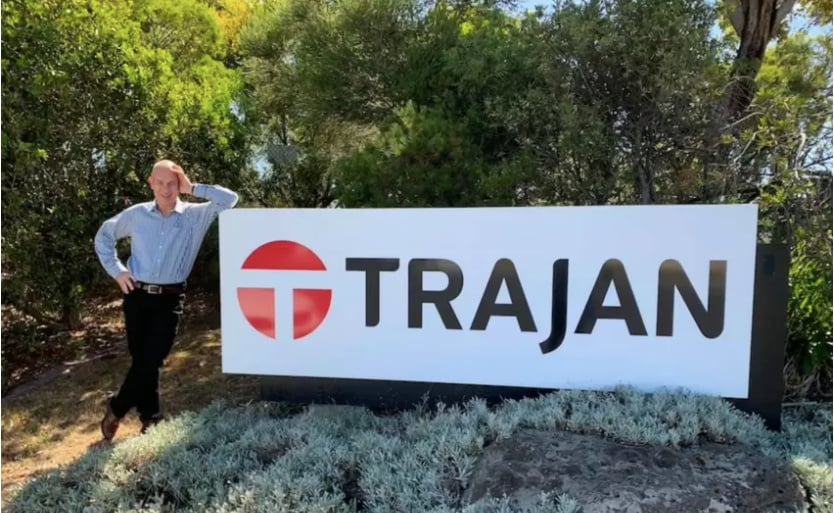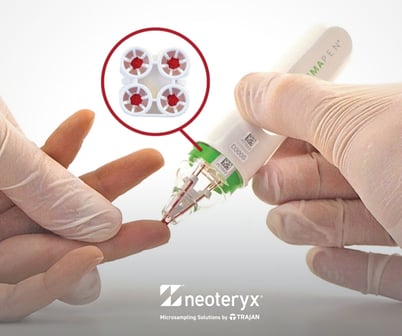Share this
Trajan Unveils Plan for Microsampling Across Research, Healthcare
by Neoteryx Microsampling on January 20,2023
Combining artificial intelligence (AI) with other medical diagnostic technologies and remote blood microsampling devices is a winning recipe for continued global health innovation in the near future, predicts Stephen Tomisich, the CEO of Trajan Scientific and Medical, a global biomedical-biotechnology company headquartered in Melbourne, Australia.
According to an article titled "A Natural Fit for Two Top Players" by Helen Trinca that appeared in the January 7, 2023, issue of The Weekend Australian, Tomisich shared that the vision for Trajan is to collaborate with innovators in science, medicine and technology to facilitate the decentralization of health care and preventive medicine. This vision includes finding ways to take health monitoring out of facilities and into the field to improve access and benefits for more people.
In his interview with Trinca for the article, Tomisich stated, "A few years back we started asking ourselves, what are the tools, what’s the science that’s going to make [decentralized healthcare] possible? We came to the conclusion that sampling blood outside of the clinical setting was essential.”
Trajan Fosters Research Collaborations That Can Leverage Microsampling & Advance Healthcare
Trinca reports that in 2020, Trajan began a collaboration with Australia's Baker Heart and Diabetes Institute, where researchers were using chemistry and tools such as mass spectrometry to develop new technology for assessing risk based on lipidomics. Under the leadership of Peter Meikle, head of the Baker's systems biology area, they studied cellular lipids and developed cutting-edge tests for heart disease and diabetes using a single drop of blood.
The Institute had the scientific capability to develop the tests but needed to figure out how to translate their tests for real-world healthcare applications. They needed a microsampling device that could be offered in easy-to-use sampling test kits that healthcare providers could ship to people at home for remote sampling.
 That is where Trajan stepped in to offer the company's expertise and products in automation, analytical measurements and remote microsampling technology. Tomisich worked with Meikle to further develop the Institute's risk assessment test for a range of cardiovascular and metabolic diseases.
That is where Trajan stepped in to offer the company's expertise and products in automation, analytical measurements and remote microsampling technology. Tomisich worked with Meikle to further develop the Institute's risk assessment test for a range of cardiovascular and metabolic diseases.
The project moved forward using Trajan's hemaPEN™ microsampling device. Marketed by Neoteryx, Trajan's microsampling product brand, this portable device can simultaneously collect and store 4 homogenous blood samples from a drop of blood collected from a single finger-stick. The test will be made possible with the microsamples collected remotely using the hemaPEN.
Can remote microsampling improve access and management of cardiovascular disease?
The article explains that the goal of the collaboration is to commercialize this lipids test for use by more people, particularly those living in remote areas who can't easily travel to hospitals or pathology labs in city centers. Once the test is available, clinicians will be able to use the information to better manage their patients' health.
Traditional testing for cardiovascular conditions involves lab tests to measure cholesterol and triglycerides in blood samples as risk markers for heart and other metabolic diseases. The new test from the Institute can measure more than 200 lipids, providing a more powerful tool and "a snapshot of a patient’s metabolism to allow more accurate stratification of risk levels." The analysis of the blood samples is done via algorithms developed by machine learning or artificial intelligence (AI).
Meikle added that the test is "potentially transformative, especially for patients who doctors find hard to identify and treat – those who are not high risk, are at no risk, but who sit in the mid-range for likely development of cardiometabolic conditions."
In response to Trinca's question about how this new test from just "a drop of blood" compares to other blood tests fraudulently marketed by the failed blood-testing company Theranos, Meikle said, "As scientists we need to be careful about not overpromising and underdelivering. Over the last 10 years or more we have been building up the evidence and having this published in scientific journals, so we’re not just spinning hype. We have analyzed probably 50,000 blood samples and these models have been developed on 10,000 individuals, and we validate those models on separate cohorts.”
Trajan, which is ranked number two on the list of companies collaborating with Australian universities, also is committed to following the appropriate scientific protocols before bringing new technologies to market. In stark contrast to Theranos, Trajan prioritizes safety and transparency in all endeavors and research partnerships, particularly those aimed at helping the company fulfill its goal of providing scientific tools and solutions that enrich personal health.
"We say to partners like the Baker, just focus on what you are best at, which is continuing to develop this model and let us focus on what we’re best at. And then you put the two together," said Tomisich.
This is curated content. To read more about the collaboration between Trajan and The Baker Institute, read the original article in The Weekend Australian or on the Trajan blog.

Share this
- Microsampling (41)
- Industry News, Microsampling News (37)
- Mitra® Device (34)
- Company Press Release, Product Press Release (22)
- Research, Remote Research (18)
- Infectious Disease, Vaccines, COVID-19 (15)
- Clinical Trials, Clinical Research (14)
- Biomonitoring, Health, Wellness (10)
- Blood Microsampling, Serology (10)
- Decentralized Clinical Trial (DCT) (8)
- Omics, Multi-Omics (7)
- Venipuncture Alternative (6)
- Skin Microsampling, Microbiopsy (5)
- Harpera Device (3)
- Specimen Collection (3)
- Toxicology, Doping, Drug/Alcohol Monitoring, PEth (3)
- Pharmaceuticals, Drug Development (2)
- Therapeutic Drug Monitoring, TDM (2)
- Antibodies, MAbs (1)
- Environmental Toxins, Exposures (1)
- Preclinical Research, Animal Studies (1)
- hemaPEN® Device (1)
- February 2026 (1)
- January 2026 (1)
- December 2025 (1)
- May 2025 (1)
- April 2025 (1)
- February 2025 (4)
- September 2024 (1)
- August 2024 (1)
- May 2024 (2)
- January 2024 (1)
- December 2023 (2)
- November 2023 (3)
- October 2023 (2)
- September 2023 (1)
- August 2023 (3)
- July 2023 (3)
- June 2023 (1)
- May 2023 (2)
- April 2023 (1)
- March 2023 (2)
- February 2023 (1)
- January 2023 (2)
- December 2022 (1)
- November 2022 (1)
- October 2022 (2)
- August 2022 (1)
- April 2022 (1)
- February 2022 (1)
- January 2022 (1)
- December 2021 (1)
- November 2021 (1)
- October 2021 (2)
- September 2021 (1)
- August 2021 (2)
- July 2021 (2)
- June 2021 (2)
- April 2021 (1)
- March 2021 (2)
- February 2021 (1)
- January 2021 (1)
- December 2020 (1)
- November 2020 (1)
- October 2020 (1)
- September 2020 (2)
- August 2020 (3)
- July 2020 (3)
- June 2020 (2)
- May 2020 (1)
- April 2020 (3)
- October 2019 (1)
- March 2019 (1)
- January 2019 (1)
- November 2018 (1)
- August 2018 (1)
- July 2018 (1)
- June 2017 (1)
- April 2017 (1)
- March 2017 (1)
- February 2017 (1)
- May 2016 (1)
- December 2015 (1)
- October 2015 (1)
- August 2015 (1)
- August 2014 (1)
- July 2014 (1)


No Comments Yet
Let us know what you think